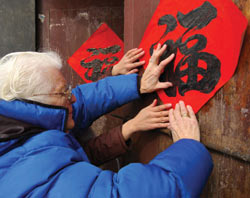| The Best of Both Worlds |
| http://www.sina.com.cn 2005/04/19 17:40 thats China |
|
 A WWCC or a shazi laowai What happens to you when you've lived in China for too long By Lin Zilong Ever seen an American strolling down Miami Beach, still sporting his socks and shoes, t-shirt stuffed inside brown slacks, and a small "man-bag" tucked squarely under his arm? How about an Aussie screaming "aiyahhh" instead of "bugger" when his footy team is losing the final? Or a Spaniard in a wine bar who's reluctant to slap two kisses on a female acquaintance? If so, you've encountered a rare but steadily multiplying member of the human race: A Westerner with Chinese Characteristics (WWCC). Booming China is becoming an increasingly attractive destination for foreigners of all descriptions, with many deciding to stay here for the long run. As time goes by, they substitute some of their native traditions and mannerisms with those of their host country. These constructions of the conscious and the subconscious are commonplace among expats in China, so I talked to a few, to find out how they had become a WWCC. One phenomenon that many WWCCs experience, in particular those who speak fluent Chinese, is the diminishing eloquence in their native tongue; the longer they are in China and the better their Chinese is, the worse the offense. The aforementioned "aiyahhh" and its synonym "ei you" are among the first Chinese expressions to invade the Westerners everyday speech and are used to express disgust, disappointment, or any other negative emotion. There is an upside however: By replacing the more colorful, Western utterances with "aiyahhh," your mother's bar of soap may last longer.
Those with a good grasp of Chinese feel their profanities are not the only casualties. British WWCC Paul Kendal says: "I'm talking about 'unlearning' English. Sometimes I find myself speaking English with Chinese grammar, especially the phrase 'how' plus the infinitive," he says. "For example, 'how to get there,' 'how to say this sentence.' It's disturbing and wrong!" Other WWCCs have trouble preventing phrases like, "Have a nice rest," or "Walk slowly," from spilling out of their mouths, much to the amusement of their friends back home. Westerners with Chinese Characteristics, particularly the female of the species, are superb hagglers. This is a skill quickly learned in Chinese markets, where all prices are negotiable. Add to the equation the Chinese street vendor's tendency to overcharge - that's an understatement - to rip "rich" foreigners off, and you'll realize that mastery of this survival technique is a must. "In a small clothes shop, I never pay more than 20 percent of the sales assistant's asking price," says Spanish WWCC Maria-Jesus Quesada. "And I won't feel guilty about it because in these shops, the clothes are always counterfeit." Asked whether she'd ever tried to use her belligerent shopping tactics at home, Quesada says, "Well, in some Spanish markets, you can haggle, but they won't try to overcharge you from the start, and you won't get such a big discount as here. Yes, I suppose I am much more aggressive haggling back home now!" Whether dining in or out, WWCCs are conspicuous beings when they return to their respective nations. For one thing, they've brought back a very different set of table manners. And where "going Dutch" is the norm among large crowds of friends, the kindly WWCC will be the first to open his wallet when the bill arrives at the table. WWCC Rick Farquharson, now back in his native Australia, says: "I feel uncomfortable splitting bills at restaurants, it seems so uncouth." Unfortunately for Farquharson, he is unable to write the bill off as a company expense nowadays. Much of Farquharson's Chinese characteristics revolve around the dinner table. "I do the finger-tapping thing, I can't go too many days without eating rice, and I feel the need to make a lot of toasts when dining with friends," he says. Munificent WWCCs, however, tend to be less charitable to the service staff. After living in China for a while, the concept of tipping tends to evaporate.
Watching WWCCs chew the fat can be both comical and catastrophic. How would you react if asked, "So how much did you earn last year?" or "How much did you pay for your wife's engagement ring?" Most Westerners without a China trip under their belt would be shocked and bruised by such an invasion of privacy, but the Chinese are obsessed with cost accounting. The phrase, "duo shao qian?" (How much money?) is as frequently used as our definite article in English. An interesting point to note is that the Chinese language actually lacks a word for "privacy." Other direct statements commonly voiced by WWCCs include, "Oh, you've put on weight!" "I have more stereotypes on people, and have become less politically correct," says Paul Kendall. "This means I'm more likely to offend strangers back in my own country." |
| 【评论】【英语论坛】【大 中 小】【打印】【下载点点通】【多种方式看新闻】【收藏】【关闭】 |

